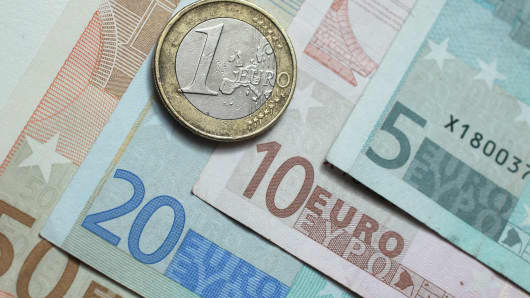Euro soars to six-month high as currency is buoyed by strong data and hawkish comments

The euro currency leaped to a six-month high on Tuesday following strong production data and hawkish talk from European policymakers.
Emmanuel Macron’s decisive victory in this month’s French presidential election has underpinned the currency’s most recent burst of strength, with his upcoming role as leader of one of the euro zone’s largest nations seen as providing a key element of support to the goal of European unity.
The single currency was trading marginally higher against both the U.S. dollar and British sterling by 1 p.m. on Tuesday, having jumped by nearly 7 percent and just under 2 percent against the respective currencies so far this year.
The latest constructive news for the currency came from flash purchasing managers’ index (PMI) data which showed the composite figure for the euro zone staying at the six-year high of 56.8 reached in April. The data also indicated that factories were hiring additional staff at the fastest rate on record for the survey.
The currency gave up its gains later in the afternoon after ECB President Draghi said the European Union could lose some of its supervision and oversight of clearing activities once Britain leaves the bloc.
“In a post-Brexit environment, UK financial market infrastructures (FMIs) would be considered as third-country FMIs rather than EU entities,” Draghi said.
Yet cautious analysts observed that most of the strength had emanated from France and Germany while growth indications from other euro zone countries in the latest batch of numbers were notably weaker.
Despite the mixed broader output signals, the currency has other newfound pillars to lean upon with German Chancellor Angela Merkel on Monday blaming a “too weak” euro for her country’s outsized trade deficit.
In comments to students in Berlin, Merkel pointed the finger at oil prices alongside the currency’s exchange rate for Germany’s surplus, which has been a source of contention between the Trump administration and her government.
“I interpret Merkel’s comment as saying between the lines that the European Central Bank (ECB) policy is just too accommodative for Germany – and its banks who are paying negative interest rates on excess reserves,” commented Carl Hammer, head of global macro & FX research at SEB, in an email to CNBC on Tuesday.
ECB President Mario Draghi gave mixed messages to markets in late April when he confirmed that he and his fellow policymakers had not discussed removing the central bank’s dovish monetary policy bias at that month’s meeting. This accompanied a comment that the recovery was firming with downside risks diminishing – a perspective that was conversely interpreted as more bullish by the markets.
SEB’s Hammer believes that the ECB may indicate that the downside risks to growth have fallen still further at its June meeting, although he notes that by then it will be too early to determine whether or not inflation has responded better to improved economic activity.
“Given that the HICP (harmonized index of consumer prices) will hardly be close to its (just below 2 percent) target, should the euro continue higher, the ECB may step up its verbal interventions again,” he surmised.
“But it will not happen on this side of 1.15 in EUR/USD,” he predicted.
Looking ahead, he expects rangebound trading.
“We expect EUR/USD to now trade in a higher range of $1.10-1.15 with a long-term fair value of approximately $1.15 per euro,” said Hammer.
“Very little at this point speaks for a move much above that range unless something more materially negative happens to the U.S. dollar,” he concluded.
[Source”timesofindia”]

